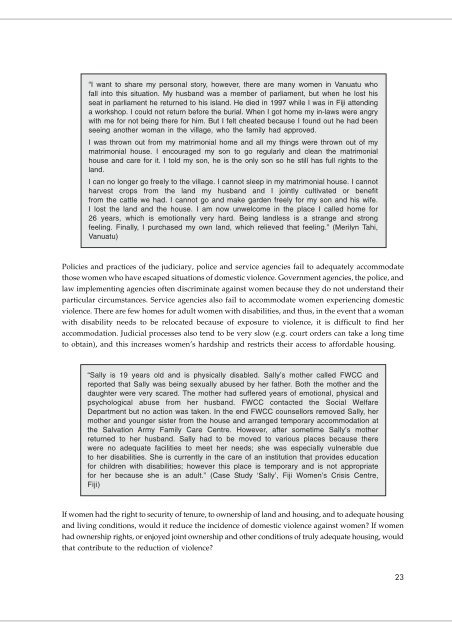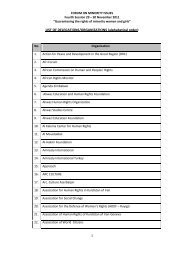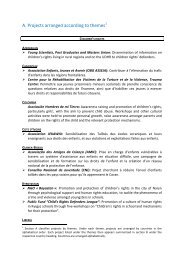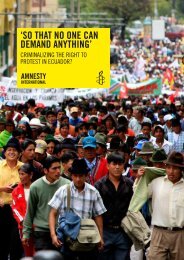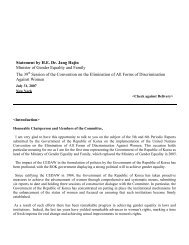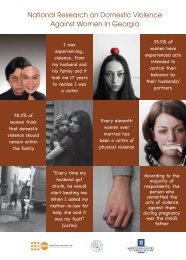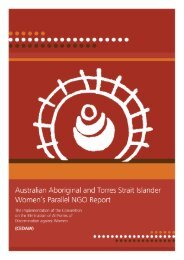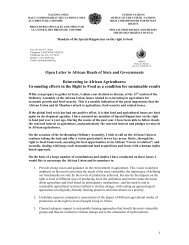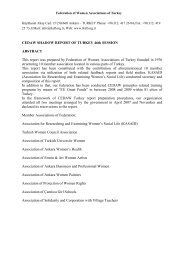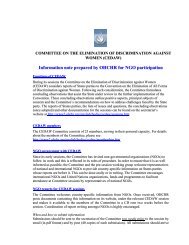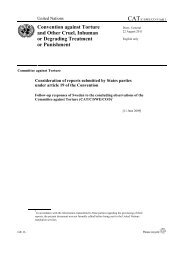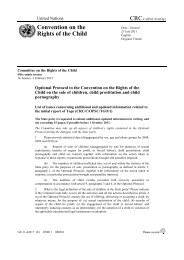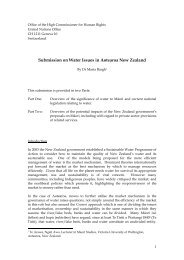Report - Office of the High Commissioner on Human Rights
Report - Office of the High Commissioner on Human Rights
Report - Office of the High Commissioner on Human Rights
- No tags were found...
Create successful ePaper yourself
Turn your PDF publications into a flip-book with our unique Google optimized e-Paper software.
“I want to share my pers<strong>on</strong>al story, however, <str<strong>on</strong>g>the</str<strong>on</strong>g>re are many women in Vanuatu who<br />
fall into this situati<strong>on</strong>. My husband was a member <str<strong>on</strong>g>of</str<strong>on</strong>g> parliament, but when he lost his<br />
seat in parliament he returned to his island. He died in 1997 while I was in Fiji attending<br />
a workshop. I could not return before <str<strong>on</strong>g>the</str<strong>on</strong>g> burial. When I got home my in-laws were angry<br />
with me for not being <str<strong>on</strong>g>the</str<strong>on</strong>g>re for him. But I felt cheated because I found out he had been<br />
seeing ano<str<strong>on</strong>g>the</str<strong>on</strong>g>r woman in <str<strong>on</strong>g>the</str<strong>on</strong>g> village, who <str<strong>on</strong>g>the</str<strong>on</strong>g> family had approved.<br />
I was thrown out from my matrim<strong>on</strong>ial home and all my things were thrown out <str<strong>on</strong>g>of</str<strong>on</strong>g> my<br />
matrim<strong>on</strong>ial house. I encouraged my s<strong>on</strong> to go regularly and clean <str<strong>on</strong>g>the</str<strong>on</strong>g> matrim<strong>on</strong>ial<br />
house and care for it. I told my s<strong>on</strong>, he is <str<strong>on</strong>g>the</str<strong>on</strong>g> <strong>on</strong>ly s<strong>on</strong> so he still has full rights to <str<strong>on</strong>g>the</str<strong>on</strong>g><br />
land.<br />
I can no l<strong>on</strong>ger go freely to <str<strong>on</strong>g>the</str<strong>on</strong>g> village. I cannot sleep in my matrim<strong>on</strong>ial house. I cannot<br />
harvest crops from <str<strong>on</strong>g>the</str<strong>on</strong>g> land my husband and I jointly cultivated or benefit<br />
from <str<strong>on</strong>g>the</str<strong>on</strong>g> cattle we had. I cannot go and make garden freely for my s<strong>on</strong> and his wife.<br />
I lost <str<strong>on</strong>g>the</str<strong>on</strong>g> land and <str<strong>on</strong>g>the</str<strong>on</strong>g> house. I am now unwelcome in <str<strong>on</strong>g>the</str<strong>on</strong>g> place I called home for<br />
26 years, which is emoti<strong>on</strong>ally very hard. Being landless is a strange and str<strong>on</strong>g<br />
feeling. Finally, I purchased my own land, which relieved that feeling.” (Merilyn Tahi,<br />
Vanuatu)<br />
Policies and practices <str<strong>on</strong>g>of</str<strong>on</strong>g> <str<strong>on</strong>g>the</str<strong>on</strong>g> judiciary, police and service agencies fail to adequately accommodate<br />
those women who have escaped situati<strong>on</strong>s <str<strong>on</strong>g>of</str<strong>on</strong>g> domestic violence. Government agencies, <str<strong>on</strong>g>the</str<strong>on</strong>g> police, and<br />
law implementing agencies <str<strong>on</strong>g>of</str<strong>on</strong>g>ten discriminate against women because <str<strong>on</strong>g>the</str<strong>on</strong>g>y do not understand <str<strong>on</strong>g>the</str<strong>on</strong>g>ir<br />
particular circumstances. Service agencies also fail to accommodate women experiencing domestic<br />
violence. There are few homes for adult women with disabilities, and thus, in <str<strong>on</strong>g>the</str<strong>on</strong>g> event that a woman<br />
with disability needs to be relocated because <str<strong>on</strong>g>of</str<strong>on</strong>g> exposure to violence, it is difficult to find her<br />
accommodati<strong>on</strong>. Judicial processes also tend to be very slow (e.g. court orders can take a l<strong>on</strong>g time<br />
to obtain), and this increases women’s hardship and restricts <str<strong>on</strong>g>the</str<strong>on</strong>g>ir access to affordable housing.<br />
“Sally is 19 years old and is physically disabled. Sally’s mo<str<strong>on</strong>g>the</str<strong>on</strong>g>r called FWCC and<br />
reported that Sally was being sexually abused by her fa<str<strong>on</strong>g>the</str<strong>on</strong>g>r. Both <str<strong>on</strong>g>the</str<strong>on</strong>g> mo<str<strong>on</strong>g>the</str<strong>on</strong>g>r and <str<strong>on</strong>g>the</str<strong>on</strong>g><br />
daughter were very scared. The mo<str<strong>on</strong>g>the</str<strong>on</strong>g>r had suffered years <str<strong>on</strong>g>of</str<strong>on</strong>g> emoti<strong>on</strong>al, physical and<br />
psychological abuse from her husband. FWCC c<strong>on</strong>tacted <str<strong>on</strong>g>the</str<strong>on</strong>g> Social Welfare<br />
Department but no acti<strong>on</strong> was taken. In <str<strong>on</strong>g>the</str<strong>on</strong>g> end FWCC counsellors removed Sally, her<br />
mo<str<strong>on</strong>g>the</str<strong>on</strong>g>r and younger sister from <str<strong>on</strong>g>the</str<strong>on</strong>g> house and arranged temporary accommodati<strong>on</strong> at<br />
<str<strong>on</strong>g>the</str<strong>on</strong>g> Salvati<strong>on</strong> Army Family Care Centre. However, after sometime Sally’s mo<str<strong>on</strong>g>the</str<strong>on</strong>g>r<br />
returned to her husband. Sally had to be moved to various places because <str<strong>on</strong>g>the</str<strong>on</strong>g>re<br />
were no adequate facilities to meet her needs; she was especially vulnerable due<br />
to her disabilities. She is currently in <str<strong>on</strong>g>the</str<strong>on</strong>g> care <str<strong>on</strong>g>of</str<strong>on</strong>g> an instituti<strong>on</strong> that provides educati<strong>on</strong><br />
for children with disabilities; however this place is temporary and is not appropriate<br />
for her because she is an adult.” (Case Study ‘Sally’, Fiji Women’s Crisis Centre,<br />
Fiji)<br />
If women had <str<strong>on</strong>g>the</str<strong>on</strong>g> right to security <str<strong>on</strong>g>of</str<strong>on</strong>g> tenure, to ownership <str<strong>on</strong>g>of</str<strong>on</strong>g> land and housing, and to adequate housing<br />
and living c<strong>on</strong>diti<strong>on</strong>s, would it reduce <str<strong>on</strong>g>the</str<strong>on</strong>g> incidence <str<strong>on</strong>g>of</str<strong>on</strong>g> domestic violence against women If women<br />
had ownership rights, or enjoyed joint ownership and o<str<strong>on</strong>g>the</str<strong>on</strong>g>r c<strong>on</strong>diti<strong>on</strong>s <str<strong>on</strong>g>of</str<strong>on</strong>g> truly adequate housing, would<br />
that c<strong>on</strong>tribute to <str<strong>on</strong>g>the</str<strong>on</strong>g> reducti<strong>on</strong> <str<strong>on</strong>g>of</str<strong>on</strong>g> violence<br />
EXECUTIVE SUMMARY 23


